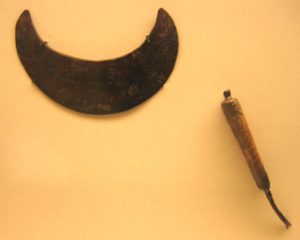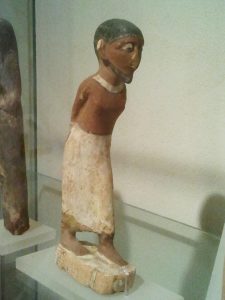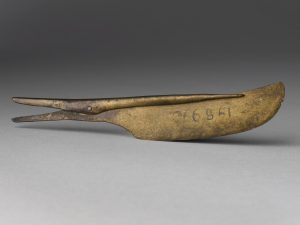Welcome to The History of Barbering, vol. 1! In this mini-series we’re going to get you guys clued up on your professional pedigree, introducing you to the pretty brutal history of the barber in a light and relaxed manner.
Volume 1 is all about early history, think early man, Egypt, Greece and Rome! And now that you’re thinking about your next holiday destinations perhaps it’s time to get down to it.

Imagine a barber coming at you with this razor (left) and trying to cut your nails with that (right)!
As you may have guessed, barbering is an ancient profession, the earliest example of a barber razor is over 20,000 years old (sadly the Dark Stag Premium Razor isn’t quite that old)! The word itself comes from the latin word “barba”, meaning beard. The earliest records of man suggest that barbers were among the foremost people of the tribe.They were the medicine men and priests, though we aren’t talking about Catholicism here. Primitive man was very superstitious, they believed that both good and bad spirits, which entered the body through the hairs on the head, inhabited every individual. The bad spirits could only be driven out of the individual by cutting the hair. I can personally guarantee the DS+ will drive out any and all primitive evil spirits.
From here we move onto the early great societies: the Egyptians, Romans, Greeks and Persians! The ancient inscriptions and monuments showed the
Egyptians shaved their heads and faces, along with highly stylised beards. Egyptian priests used to shave their entire body every third day! Unfortunately they did these with primitive small bronze hatchets with curved handles, nothing so elegant as the Cut Throat Razor, so we can’t say for certain how close that shave really was. And nicking the skin is probably bit more serious when it’s a hatchet…
Not even the Bible is safe from the influence of the barber: when Joseph was summoned to appear before Pharaoh, a barber was sent for to shave Joseph, so that Pharaoh’s sight would not be offended by a dirty face! Bit extreme, eh?
The ancient Greek barbershop was a place of high esteem: statesmen, poets, and philosophers all came to have their beards shaved and their hair cut, so much so that the profession became extremely competitive, and where the idea of barbering as more art than profession stems. These high profile people would discuss the news of the day, politics, and for socialising, making barbers leading citizens. Beard trimming in particular was seen as an art, with beard curling and scenting with costly essences the go to for the rich and powerful. For precision and control in beard styling and trimming nothing beats the Premium Razor, with a replaceable blade system it is the perfect tool for any barbershop.
Beards fell out of fashion in the 3rd century BC, when Alexander the Great lost several battles to the Persians, a clean shaven folk, who are said to have beaten his Macedonians by pulling their beards to the ground and spearing them! Alexander ordered them to be shaved from then, and the general populace imitated their leader and his highly respected soldiers.
Romans, unsurprisingly, had barbers too, since 296 BC, when Ticinius Mensa came from Sicily bringing the art of shaving with him. Here they set the trend of ‘barbers’ being the place to meet, socialise and gossip much as they are today. The absence of beards actually set apart ‘Free’ men from the slaves. No people were better patrons of the barbers than the Romans. They often devoted several hours each day to tonsorial operations, which included shaving, hair cutting, hairdressing, massaging, manicuring and the application of rare ointments and cosmetics of unknown formulas. If you’re looking for that all-in-one experience at home, look no further than the Dark Stag Shaving Set!
And so there we have it! The earliest known history of barbering neatly tied together in one article!
Until next time
Dark Stag Team
All images displayed in this article are used from wikimedia commons.







